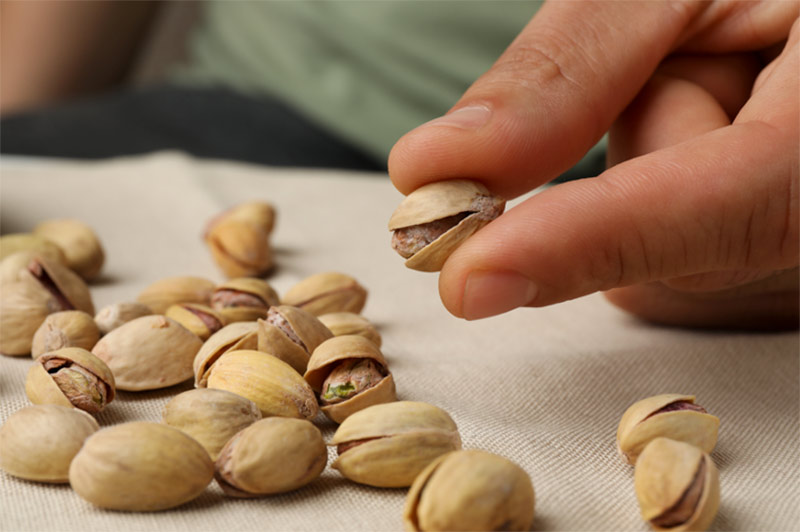By Linda Conlin, Pro to Pro Managing Editor

Fall is a big season for sports and many of us will spend more couch time watching the games. Of course, watching sports comes with snacks. Whether you’re choosing among pretzels, chips, popcorn, or other favorites, consider pistachios. In addition to the game-stress relief of cracking open the shells, they boost eye health, so you don’t miss a play.
A new study from researchers at the Friedman School of Nutrition Science and Policy at Tufts University has found that consuming pistachios daily may significantly improve eye health by increasing macular pigment optical density (MPOD) due to the plant pigment lutein, a key factor in protecting the eyes from blue HEV light and age-related damage (Scott, T. M., et al. 2024). Previous studies have shown the benefits of pistachios for eye health, but this study showed a direct effect on MPOD. (https://www.2020mag.com/article/pistachios-for-eye-health)
Pistachios are the only nut that provides a measurable source of lutein, one of two antioxidants (the other is zeaxanthin) that have been shown to reduce the chances of developing cataracts and protect against age-related macular degeneration (AMD). Antioxidants help cancel damaging free radicals and absorb blue HEV light to help to protect the retina and prevent free radical damage to the macula. The study found that pistachio consumption nearly doubled participants' daily intake of lutein, which is typically very low in most American diets, and significantly raised plasma levels of lutein.
Thirty-six healthy, nonsmoking women and men, between the ages of 40 and 70 years were enrolled and randomized into the study for 12 weeks. The control group did not change their usual diets (UD) and did not consume pistachios. Those randomized to the pistachio plus usual diet (PIS) group were given a daily supply of 2-ounce packets of shelled, roasted, unsalted pistachio nuts to add to their diets. At week 6, there was a highly significant increase in MPOD in the PIS group. Over the course of the 12-week study, MPOD did not significantly change in the UD group. These findings suggest that inclusion of pistachio nuts in a healthy diet could be an effective dietary strategy for promoting eye health.
Beyond supporting eye health, the lutein found in pistachios may also benefit brain function. As with the eye, lutein selectively accumulates in the brain and may play a role in reducing cognitive decline. Studies suggest higher lutein levels are associated with better cognitive performance, including memory and processing speed, making pistachios a valuable addition to a diet aimed at supporting overall healthy aging. (Tammy M. Scott, et al., Pistachio consumption increases Macular Pigment Optical Density in healthy adults: a randomized controlled trial, The Journal of Nutrition, 2024) So sit back, crack open some pistachios, and enjoy the game!












